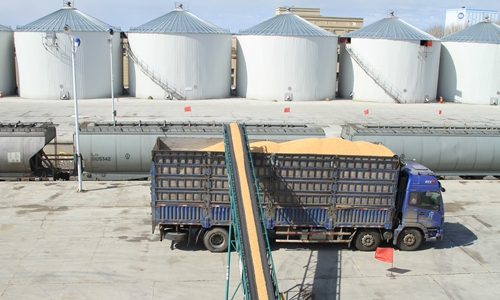Netizens believe China’s grain storage could last more than 1 year
By GT staff reporter Source:Global Times Published: 2020/5/23 17:36:19

Corn is seen in China's Heilongjiang Province, one of the nation's major grain producers. The corn will be transported to southern cities in China to meet the urgent need for grain, fodder and disinfectants. Photo: cnsphoto
Chinese Minister of Agriculture and Rural Affairs Han Changfu's comments on China's grain storage, made on the sidelines of the ongoing two sessions on Friday, have stirred discussion on China's microblog platform Weibo on Saturday.
Some Chinese netizens believe China's grain storage could sustain the country for more than one year, the grain self-sufficiency period for rice and wheat that the agriculture minister announced on Friday, for a country with 1.4 billion people.
Han's comments came as many grain exporting countries around the world have stopped or reduced their exports amid the COVID-19 pandemic.
"I can definitely say that China will have no food crisis, with absolute grain security," Han said. The minister noted that the coronavirus outbreak has prompted some countries to increase their grain storages, and major exporting nations to rein in exports.
The locust plague that has inflicted alarming losses to many parts of Africa and Asia has stoked fears of a looming global grain shortage.
Han's comments also come as netizens jeered at a so-called commentator from the island of Taiwan claiming a protein shortage has forced people on the Chinese mainland to eat voles.
Some netizens, apparently from rural backgrounds, said the grain storage in their homes can sustain up to three years' consumption, while others point to Chinese official's often reserved rhetoric.
The rampant outbreak of the coronavirus in Brazil, after the World Health Organization described Latin America as a new epicenter of the pandemic with Brazil's confirmed cases becoming the second largest worldwide on Friday, has fueled concerns about its agricultural exports, important to China amid its trade tensions with the US and after the tariff hikes on some Australian products.
However, Jiao Shanwei, editor-in-chief of grain news website cngrain.com told the Global Times that Brazil's agriculture production and exports to China are not likely to see a substantial drop even as the COVID-19 pandemic is raging on in the Latin American country.
"Unless the pandemic leads to a halt of Brazil's major ports' operations, it's agricultural products exports to China will not see a major fall this year," Jiao said, adding that the epidemic has little effect on the output of mechanized agriculture and the logistics of international bulk agricultural products.
According to the latest statistics, the raging COVID-19 doesn't have much impact on the logistics and trade of global agricultural commodities.
Jiao said Brazilian beef exporters still stand a good chance for more of a market slice in China despite the pandemic.
"Brazilian beef may seek more Chinese market shares as Australia isn't sending positive signals in repairing soured trade ties with China," Jiao said.
China halted the exports of several leading Australian beef exporters due to inspection and quarantine breaches in earlier May.
Posted in: INDUSTRIES